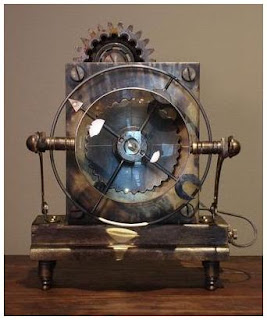
Art Donovan is a regular reader and commenter here at The Steampunk Home. He's also, as the proprietor of Donovan Design, a designer and craftsman of lamps, lighting, and the occasional home accessory. Art was kind enough to mention his newest steampunk inspired pieces to me, and, of course, I want to share them with you.

His early steampunk efforts are online at HomePorfolio. First a steampunk clock in distressed brass (who even knew you could distress brass? I assumed you antiqued brass, but this is a very different look than antiquing.) Second is a steampunk style table lamp, with 4(!) different adjustment points.

Art's pièce de résistance, however, is his Siddhartha Pod Lamp, pictured at the beginning of this post. At 52" tall x 30" wide, it's an impressive, piece of work. It's entirely hand crafted of solid mahogany, solid copper and brass. Without a doubt, the most labor-intensive lamp I've ever created. Personally, I see it in the home of a evil mastermind -- something about the curlicue wood at the top reminds me of a mustache twirled by such a dastardly fellow.


Art is known to hang around here at the SPH, so if you have questions for him, feel free to post in the comments. (Mine: What are the vertical glowing light-bulb style tubes? Why name it Siddhartha -- I'm not quite sure I see the link between steampunk style and the Buddha?)
UPDATE! Art sent me answers to my questions:
To answer your questions- Easy! The tall light bulbs are called "Showcase bulbs" and they are really bright- 75 watts each. (#75T8) Add some "Baby Slinkys" around the bulbs and you're ready to go!
I have a dimmer switch for them located at the top of the lamp, (it's that little cone-shaped piece, pointing downward.) When the bulbs are turned all the way up (which I never do) they are massive, ridiculous bright.
All of our lamps are named by my wife and partner, Leslie. She also designs lamps and won't name them until they're completely finished. The "Siddhartha Pod" lantern has design elements of the British Raj Period of India, so that was her inspiration for the name. The "Pod" refers to the strange, vertical shape- (vaguely bio-mechanical like, I suppose).





